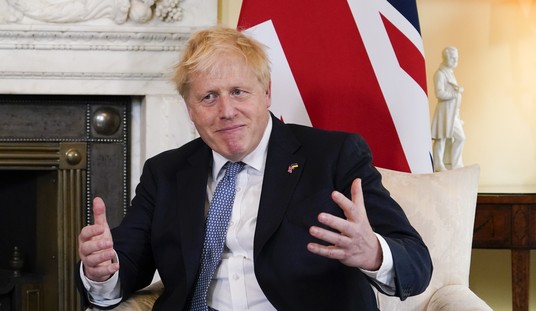Speaker Paul Ryan emerged from his meeting with Donald Trump Thursday saying he was encouraged by what he heard. He still didn’t endorse Trump; he said unity will take time and he didn’t want “a fake unification process.” According to press reports, Trump was on his best behavior and mostly listened.
Trump’s charm offensive apparently worked on others he spoke with on Capitol Hill. Lindsey Graham’s attitude towards him even seems to have softened. The word of the day was “unity,” which they all said they wanted.
But they need to answer the relevant question: “At what price?”
Suppose you have successfully grown a small business into a large and profitable company. Just when your successful company has gone public, organized crime decides to invest heavily in it, and before you know it, they own controlling shares. The firm may have the same name, but it is now owned lock, stock, and barrel by the mob — who are using it for nefarious activities.
Would you pretend that the firm is the same one you founded?
Would you continue to be involved in it, encouraging the public to buy shares? Or would you realize that what you spent years creating is now run by those you despise, and it’s time to get out and go your own way?
The Republican Party has suffered a hostile takeover by the Trumpistas, turning a party influenced by conservative principles into a nationalist/protectionist party. If Trump is consistent — yes, he is anything but — the new Republican Party will differ from the one we knew just a short time ago.
Just how do traditional conservatives and Republicans differ from Donald Trump? At National Review, David French outlines fifteen areas. They include Trump’s promises to: raise taxes; increase the federal minimum wage; provide universal health care for all; keep both Medicare and Social Security as they are without making any changes whatsoever; change libel laws to allow one to sue anyone who writes an article disagreeing with you; and finally, advance nutty conspiracy theories. His latest was the notion that Ted Cruz’s father had something to do with the assassination of JFK.
One of the areas Paul Ryan feels particularly strong about is the elephant in the room — growing federal entitlements. Most conservatives know that both Medicare and Social Security are destined for bankruptcy, quicker if they expand, and that avoiding dealing with them is dangerous. Centrist Democrats like William Galston have been arguing the same thing for years. As he writes:
The longer we wait, the more abrupt and draconian the necessary changes will be.
Paul Ryan could easily find common ground with Galston. Not so with Trump. On this issue, there is little difference between Trump and Hillary Clinton — or for that matter, with Bernie Sanders.
As Chris Jacobs writes in National Review:
Conversely, by claiming he can “save Social Security and Medicare without cuts,” Trump is effectively signing Republicans up for a $28 trillion tax increase to “save Medicare” — and more besides for Social Security.
If you look at Trump’s foreign policy, gleaned from his recent address at Center for the National Interest, you will find a combination of building a “fortress America” at home and restricting America’s role abroad (call it realism or neo-isolationism) while pursuing a very dangerous alliance with Putin and Russia — whom he trusts will defeat ISIS for us. Trump’s foreign policy, in many ways, is a continuation of Obama’s. Trump advocates Obama’s retreat from American leadership which, as we’ve seen, has estranged our allies, strengthened radical Islamists, and allowed Putin to run roughshod over Crimea and Ukraine, enhancing his standing abroad.
Now, foreign leaders seeking to do business go to Russia rather than the United States.
What then, should we do? I fully support those who maintain their integrity and stand for “Neither Trump nor Clinton,” and who are calling for a third-party candidate: a genuine center/right figure to run and give the electorate an alternative. Such a candidate could, in addition to winning the vote of conservatives, take along independents in swing states and disaffected Democrats who reject a party that has moved far to the left.
With luck, a third-party candidate could deprive Trump and Clinton from gaining enough electoral college votes to win. In such an event it would go to the House, which must pick from the top three vote-getters, and they would not pick Trump.
Yes, it could turn out that this would lead to a Hillary presidency. So let me say it: in my opinion, Hillary is the lesser evil. There is nothing wrong with voting for a candidate who one thinks fits that description.
I am fully aware of all her negatives, of which there are many. In this I disagree with many in the Republican Party who are rushing to support Trump not because they like him or think he will be a good president, but because they want to defeat her.
On foreign policy, there is hope that Hillary Clinton will take a course that asserts American leadership abroad rather than the erratic and dangerous course it would take under a Trump presidency. With policy experts like Robert Kagan and General Jack Keane talking to her, we know she is getting good advice from serious non-leftist advisors.
Otherwise, we can find other ways to place roadblocks in front of her ever more leftist domestic policy prescriptions, which she has been suddenly advocating in a desperate hope to stem the flow of support to Bernie Sanders.
I leave you with the words of humorist P. J. O’Rourke:
Better the devil you know than the Lord of the Flies on his own 757. Flying to and fro in the earth, with gold-plated seatbelt buckles, talking nativist, isolationist, mercantilist, bigoted, rude, and vulgar crap. …
Better the scurrying of mousey progressivism gnawing at the fabric of society in the White House than a rat sitting on the Oval Office desk. Better to root up the garden of free enterprise with the Democratic pigs than run off a protectionist cliff with the Gadarene swine Republicans.
You get it, P.J.









Join the conversation as a VIP Member